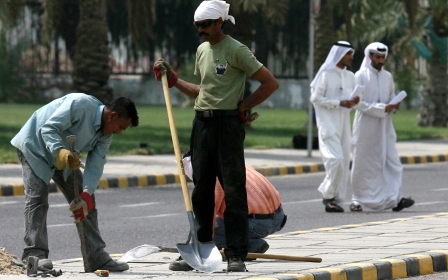Arabic press review: Palestinian with cancer and Covid stuck in Israeli prison

International appeal to free sick Palestinian prisoner
The Palestinian foreign ministry has launched an international campaign calling on Israel to release Kamal Abu Waer, a prisoner suffering from the coronavirus and cancer.
Abu Waer, 46, is serving multiple life sentences at Israel's Gilboa prison for his role in attacks on Israeli civilians during the Second Intifada.
His health has deteriorated in recent months following a diagnosis of throat cancer, and he is currently hospitalised at Assaf Harofeh Medical Center.
Palestinian President Mahmoud Abbas has called on all responsible authorities to wage an "international campaign" to put pressure on Israel to provide Abu Waer with proper treatment and urge his immediate release, according to a report published by the London-based newspaper al-Quds al-Arabi.
New MEE newsletter: Jerusalem Dispatch
Sign up to get the latest insights and analysis on Israel-Palestine, alongside Turkey Unpacked and other MEE newsletters
Abbas reportedly called the prisoner's father to discuss his condition.
The foreign ministry announced that they had initiated action at several levels, including the United Nations and its institutions such as the Human Rights Council and the World Health Organisation (WHO).
Ministry official Omar Awadallah said the WHO would also be asked to activate an earlier decision to form a committee of inquiry to examine the health conditions of Palestinian prisoners in Israeli prisons and the conditions of their detention.
He said the issue of Abu Waer had been raised with the office of the Secretary-General of the United Nations, and that the matter would be handled by the Permanent Observer of the State of Palestine to the United Nations, Ambassador Riyadh Mansour.
Kuwait reduces salaries of expatriates retroactively
A Kuwaiti government source has revealed that the cabinet has introduced a new amendment to a proposed law to reduce the salaries of expats in the private sector.
Rather than from the present date, reductions will be retroactively applied from 12 March when economic activities in the country were suspended, according to London-based al-Arabi al-Jadeed newspaper.
The decision aims to enable companies to negotiate with their employees regarding overdue salaries and resume business without legal problems.
Al-Arabi al-Jadeed quoted a source as saying that the law aimed to protect both employers and expats, as it would only be applied in periods of crisis only.
The same source, who spoke on condition of anonymity, said hundreds of companies had submitted complaints to the cabinet over heavy losses incurred during past months due to forced closures over the coronavirus, pointing out that private sector companies want to avoid lawsuits from expatriates whose salaries have been reduced by up to 50 percent, or those who have been granted leave without pay.
A report by the International Economic Research Consultancy revealed that the total losses for the private sector in Kuwait from 12 March to 31 June amounted to about $12.5bn, due to the suspension of commercial activities and declining consumption rates.
The number of visitors to shops, markets and shopping centres in Kuwait has decreased by 70 percent, while thousands of expatriates have seen the termination of their contracts.
Jordan orders two million doses of potential vaccine
Jordan's Helath Minister Saad Jaber has signed an agreement with the US healthcare giant Pfizer to provide the country with two million doses of a potential coronavirus vaccine once it has been manufactured and proved to be successful on a global scale, Amman-based al-Ghad newspaper reported.
Jaber said the agreement arose from joint efforts of the government and the ministry to provide vaccines for Jordanians after research centres conducted third-stage experiments on the medication and initiated human trials.
He added that the ministry had also signed several agreements with other major international companies to provide Jordan with doses in case any of their vaccines were successful by the end of the year.
* Arabic press review is a digest of reports that are not independently verified as accurate by Middle East Eye.
Middle East Eye delivers independent and unrivalled coverage and analysis of the Middle East, North Africa and beyond. To learn more about republishing this content and the associated fees, please fill out this form. More about MEE can be found here.




